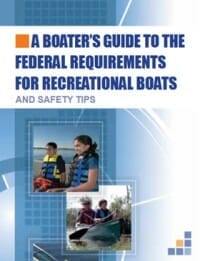 By Bob Currie, Vessel Examiner
By Bob Currie, Vessel Examiner
United States Coast Guard Auxiliary Flotilla 081-06-08
USCG Auxiliary Flotilla 081-06-08 is based at Coast Guard Station Galveston. The Auxiliary’s vessel examiners perform safety checks on all types of recreational boats. The list of equipment required by federal law is very minimal; however, the Coast Guard has several recommendations for consideration by the prudent and safe recreational boater. Many of the recommendations for recreational boaters are actually required of commercial vessels.
Weather and Sea Conditions
Boaters should always check the local weather forecast before leaving the dock. Besides newspaper, radio, and television forecasts, boaters should get to know online forecasts published and updated frequently by the National Weather Service (NWS) and various private sector forecasting companies. Ships, marinas, and yacht clubs also may display storm warning flags. There are some good smart phone apps available. I use Storm Radar and the National Oceanic and Atmospheric Administration (NOAA) app, NowCOAST. Both are GPS-based and track your location in reference to the maps.
Boaters should try to become proficient in recognizing weather changes when they are out on the water. They also should check the NWS forecast hourly on VHF-FM weather channels 1 through 10. Channel 1 is the active channel in our area. If you have a recommended marine radio, you can scan the weather channels in addition to the requirement to monitor channel 16, although the Coast Guard does give weather updates as well.
If the weather rapidly deteriorates, boat operators should reduce speed while keeping enough power to maintain headway, have crewmembers and passengers put on life jackets, turn on navigation running lights, head for the nearest safe harbor, steer the bow of the boat into the waves at a 45-degree angle, strive to keep bilges free of water, and seat passengers on the bottom of the boat, near the centerline. In the event of an engine failure, the operator should put out a sea anchor (see pictures) to keep the boat headed into the waves. A metal bucket can serve as a sea anchor in an emergency. If necessary, anchor and ride out the storm or heavy seas, and call for help on your phone or radio.

Insurance and Towing Considerations
Some states require proof of insurance before registering a vessel. In any case, it is a good idea to carry marine insurance. Although Texas does not require you to carry marine insurance, it is quite reasonably priced and gives you peace of mind. Among the items that may be covered by a marine insurance policy are loss of the boat, loss of equipment carried on board, protection against liability for personal injury or property damage, medical coverage in case of injury, and the cost of towing the boat in the water or carrying it by trailer on land.
Boaters should talk to an insurance agency about the kind of coverage that may be best for their boat. Coverage can be part of a homeowner policy or provided in a separate boat insurance policy. Towing insurance is often separate from liability insurance. Some companies may offer discounts to boaters who complete boating safety classes or whose boat passes a vessel safety check.
Responsible Seamanship – Maritime Domain Awareness
Marine Domain Awareness means knowing what is going on in every direction and thinking in advance about how to deal with it. When a motorist drives along an interstate highway, he or she must not only watch the road that is directly ahead. The driver also has to keep an eye out for cars entering or preparing to exit the main highway; passing on either side; or tailgating too closely. If the road runs through the mountains, the motorist also may have to watch out for sudden curves; fallen rocks; or the absence of shoulders. The person steering (or in command of) a boat faces similar challenges. Is that cargo vessel steaming up the bay likely to pose a danger to the boat he or she is operating?  If so, what action should the operator take? Slow down? Change course? A good helmsman is constantly checking for boat traffic, changes in sea state, weather patterns, and other factors affecting the boat, and relies on other crew members (and even some passengers) to help serve as lookouts. At the first sign of any changes, he or she begins making plans to deal with the new situation and to inform the crew on what action will be taken.
If so, what action should the operator take? Slow down? Change course? A good helmsman is constantly checking for boat traffic, changes in sea state, weather patterns, and other factors affecting the boat, and relies on other crew members (and even some passengers) to help serve as lookouts. At the first sign of any changes, he or she begins making plans to deal with the new situation and to inform the crew on what action will be taken.
Please see this link to download this brochure : http://uscgboating.org/images/420.PDF
For more information on boating safety, please visit the Official Website of the U.S. Coast Guard’s Boating Safety Division at www.uscgboating.org. Questions about the U.S. Coast Guard Auxiliary or our free Vessel Safety Check program may be directed to me at [email protected]. I am available to perform free Vessel Safety Checks, and I will come to your location to perform them. SAFE BOATING!
[12-18-2017]

 Posted in
Posted in 























